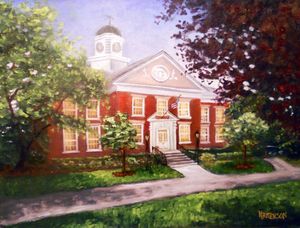Holding Court: Adverse Possession

Holding Court is a series by retired Rye City Court Judge Joe Latwin. Latwin retired from the court in December 2022 after thirteen years of service to the City.
What topics do you want addressed by Judge Latwin? Tell us.
By Joe Latwin
No, no, they can’t take that away from me….
You bought, paid for, paid the taxes and have the deed to real estate. Now, your neighbor claims some or all of it now belongs to him. Is that possible? There is a thing called adverse possession that allows someone to claim ownership of land that once belonged to someone else by exercising indicia of ownership for a period of time.
A party seeking to obtain title by adverse possession must prove by clear and convincing evidence: that: (1) the possession was hostile and under claim of right; (2) it was actual; (3) it was open and notorious; (4) it was exclusive; and (5) it was continuous for the statutory period of 10 years. Hostile does not mean you go over to the property armed and spew vile words. It simply means there must be some disputation of the titled owners claims. Under a claim of right requires that you have some basis to believe that the property was yours in the first place. There must be some actual possession in that you erected a structure or did something to or on the land itself. To be open and notorious means that the claim could be apparent to an outsider and the titled owner. Notorious refers neither to Biggie Smalls nor the 1946 Hitchcock movie starring Cary Grant, Ingrid Bergman, and Claude Rains. It means it is open to view. Exclusive doesn’t mean only the elite are welcome, but rather that you have the right to or actually kept people out – you excluded them from the property. All this must happen for ten continuous years without a break.
The adverse possession issue is usually decided in court either when the owner seeks to eject the claimant, or the claimant seeks to eject the owner. Usually, adverse possession claims arise where the disputed property was either “usually cultivated or improved” or “protected by a substantial enclosure”. The claimant often claims they mowed the lawn or planted a garden in the disputed area or erected or moved a fence or wall around the area.
Frequently, adverse possession claims fail because there is no viable claim of rightful ownership by the claimant. Courts also look skeptically on mowing claims.
So how do you avoid an adverse possession lawsuit? Like many situations, a cordial communication may divert unpleasantness. The property owner should regularly (at least once every 10 years!) inspect the entire property to make sure there is no activity occurring that might give rise to a claim. This include making sure there are no structures that weren’t there before, no gardening or cultivation having occurred, and no new footpaths being tread. The claimant might want to approach the owner to come to some understanding that would accommodate the goals of the parties. For instance, if the claimant wants to put up a fence or create a vegetable garden, the owner may permit it, with or without compensation, accompanied by license agreement that preserves the owner’s rights while granting the claimant a license to do what he wants. These agreements must be in writing and should be filed as a land record.
While good fences may make good neighbors, adverse possession claims lead to frosty situations.





